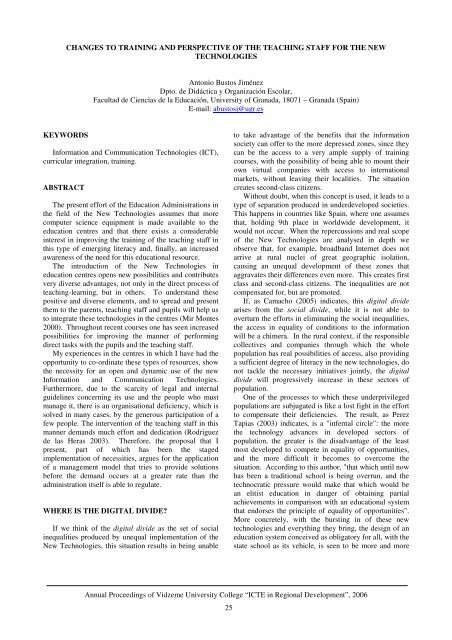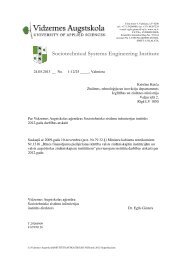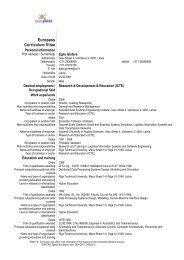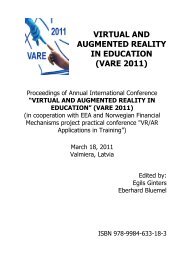<strong>in</strong>tegration of many different issues that are relevant <strong>in</strong>a variety of aspects of course development.Requirements for course development imposed bymultiple issues are rarely formally def<strong>in</strong>ed, areoverlapp<strong>in</strong>g and quite hard to be transparently<strong>in</strong>tegrated. In such situation success and quality ofcourse development depends on modell<strong>in</strong>g technique tobe used for handl<strong>in</strong>g complexity of the task. In thispaper we suggest EKD modell<strong>in</strong>g as an effectivemethod for gett<strong>in</strong>g a detailed enough and transparentoverall picture about develop<strong>in</strong>g process for cont<strong>in</strong>u<strong>in</strong>geducation course.The presented results will be improved andimplemented <strong>in</strong> the current project “Cont<strong>in</strong>u<strong>in</strong>geducation programme to strength capacity of SME bydevelop<strong>in</strong>g ICT <strong>in</strong>frastructure and knowledgemanagement” and further <strong>in</strong> the project “Us<strong>in</strong>g E-learn<strong>in</strong>g solutions for development and implementationof IT cont<strong>in</strong>u<strong>in</strong>g education program modules(MULTIMOD)”.REFERENCESBubenko, J.A., M. Kirikova. 1999. Improv<strong>in</strong>g theQuality of Requirements Specifications by EnterpriseModell<strong>in</strong>g. Perspectives on Bus<strong>in</strong>ess Modell<strong>in</strong>g:Understand<strong>in</strong>g and Chang<strong>in</strong>g Organisations,A.G.Nilsson, Ch.Tolis, Ch.Nellborn – Berl<strong>in</strong>;Niedelberg; New York; Barcelona; Hong Kong;London; Milan; Paris; S<strong>in</strong>gapore; Tokyo: Spr<strong>in</strong>ger..Corbiere, A., C. Choquer. 2004. Re-eng<strong>in</strong>eer<strong>in</strong>gmethod for multimedia system <strong>in</strong> education. In:<strong>Proceed<strong>in</strong>gs</strong> of the IEEE Sixth InternationalSymposium on Multimedia Software Eng<strong>in</strong>eer<strong>in</strong>g,IEEE.We<strong>in</strong>gand, Darlene E.. 1999. Describ<strong>in</strong>g the elephant:what is Cont<strong>in</strong>u<strong>in</strong>g Professional Education? In<strong>Proceed<strong>in</strong>gs</strong> of Council and General Conference ofInternational Federation of Library Associations,Thailand.EDUCAUSE IMS. 2005. [accessed 05.05.2006]IEEE/LTSA. 2003. “IEEE Standard for Learn<strong>in</strong>gTechnology-Learn<strong>in</strong>g Technology <strong>Systems</strong>Architecture (LTSA),” IEEE Computer Society 0-7381-3715-4.ISO/IEC-IS-10746-3. 1995. “Open DistributedProcess<strong>in</strong>g Reference Model, Part 3: Architecture,”ISO/IEC JTC.SC 21.Kapenieks, A., et. al. 2000. New IT-based VirtualSolutions for Learn<strong>in</strong>g and University Development.<strong>Proceed<strong>in</strong>gs</strong> of conference Baltic IT&T, April 2000,87-89Khaldoun, A., et. al. 2000. Modular Development ofMultimedia Courseware. In <strong>Proceed<strong>in</strong>gs</strong> of the 1 thInterrnational Conference on WEB In<strong>format</strong>ion<strong>Systems</strong> Eng<strong>in</strong>eer<strong>in</strong>g, IEEE.Koper, R., and C. Tattersall. 2005. Learn<strong>in</strong>g Design. AHanbook on Modell<strong>in</strong>g and Deliver<strong>in</strong>g NetworkedEducation and Tra<strong>in</strong><strong>in</strong>g .Netherlands. Spr<strong>in</strong>ger, 412 p.Pöyry, P. 2003. CUBER: A Personalised CurriculumBuilder. In: <strong>Proceed<strong>in</strong>gs</strong> of the 3 rd IEEE InterrnationalConference on Advanced Learn<strong>in</strong>g Technologies,IEEE.Bubenko, J. A., jr, A. Persson, and J. Stirna. 2001. Userguide of the Knowledge Management approach us<strong>in</strong>gEnterprise Knowledge Patterns, Royal Institute ofTechnology (KTH) and Stockholm University,Stockholm,Sweden,,[accessed April 30, 2006].Trapenciere, I. 2004. Life long learn<strong>in</strong>g <strong>in</strong> Latvia. In:Aspects of life long learn<strong>in</strong>g <strong>in</strong> Latvia. Rīga: CentralStatistical Bureau of Latvia, 20 – 30.W3C. 2006. Extensible Markup Language (XML).[accessed 05.05.2006]BIOGRAPHYG<strong>in</strong>ta Stale is teacher of the IT department at theVidzeme University College Latviaand project manager at Riga Technical universityDistance Education Study centre; has higherprofessional education <strong>in</strong> Computer <strong>Systems</strong> andexperience <strong>in</strong> project management <strong>in</strong> the Phare CBCprogramme <strong>in</strong> the Baltic Sea Region 2001 project“Achiev<strong>in</strong>g Social Inclusion by the Application of E-Learn<strong>in</strong>g solutions at College RRC”Marite Kirikova is associated professor at RigaTechnical University, author of more than fiftyscientific publications on <strong>in</strong><strong>format</strong>ion systems andknowledge management, did field research onknowledge management <strong>in</strong> e-learn<strong>in</strong>g at Boise StateUniversity, USA; and field research on enterprisemodell<strong>in</strong>g and requirements eng<strong>in</strong>eer<strong>in</strong>g at StockholmUniversity and Royal Institute of Technology, Sweden.Annual <strong>Proceed<strong>in</strong>gs</strong> of Vidzeme University College “ICTE <strong>in</strong> Regional Development”, 200624
CHANGES TO TRAINING AND PERSPECTIVE OF THE TEACHING STAFF FOR THE NEWTECHNOLOGIESAntonio Bustos JiménezDpto. de Didáctica y Organización Escolar,Facultad de Ciencias de la Educación, University of Granada, 18071 – Granada (Spa<strong>in</strong>)E-mail: abustosj@ugr.esKEYWORDSIn<strong>format</strong>ion and Communication Technologies (ICT),curricular <strong>in</strong>tegration, tra<strong>in</strong><strong>in</strong>g.ABSTRACTThe present effort of the Education Adm<strong>in</strong>istrations <strong>in</strong>the field of the New Technologies assumes that morecomputer science equipment is made available to theeducation centres and that there exists a considerable<strong>in</strong>terest <strong>in</strong> improv<strong>in</strong>g the tra<strong>in</strong><strong>in</strong>g of the teach<strong>in</strong>g staff <strong>in</strong>this type of emerg<strong>in</strong>g literacy and, f<strong>in</strong>ally, an <strong>in</strong>creasedawareness of the need for this educational resource.The <strong>in</strong>troduction of the New Technologies <strong>in</strong>education centres opens new possibilities and contributesvery diverse advantages, not only <strong>in</strong> the direct process ofteach<strong>in</strong>g-learn<strong>in</strong>g, but <strong>in</strong> others. To understand thesepositive and diverse elements, and to spread and presentthem to the parents, teach<strong>in</strong>g staff and pupils will help usto <strong>in</strong>tegrate these technologies <strong>in</strong> the centres (Mir Montes2000). Throughout recent courses one has seen <strong>in</strong>creasedpossibilities for improv<strong>in</strong>g the manner of perform<strong>in</strong>gdirect tasks with the pupils and the teach<strong>in</strong>g staff.My experiences <strong>in</strong> the centres <strong>in</strong> which I have had theopportunity to co-ord<strong>in</strong>ate these types of resources, showthe necessity for an open and dynamic use of the newIn<strong>format</strong>ion and Communication Technologies.Furthermore, due to the scarcity of legal and <strong>in</strong>ternalguidel<strong>in</strong>es concern<strong>in</strong>g its use and the people who mustmanage it, there is an organisational deficiency, which issolved <strong>in</strong> many cases, by the generous participation of afew people. The <strong>in</strong>tervention of the teach<strong>in</strong>g staff <strong>in</strong> thismanner demands much effort and dedication (Rodriguezde las Heras 2003). Therefore, the proposal that Ipresent, part of which has been the stagedimplementation of necessities, argues for the applicationof a management model that tries to provide solutionsbefore the demand occurs at a greater rate than theadm<strong>in</strong>istration itself is able to regulate.WHERE IS THE DIGITAL DIVIDE?If we th<strong>in</strong>k of the digital divide as the set of social<strong>in</strong>equalities produced by unequal implementation of theNew Technologies, this situation results <strong>in</strong> be<strong>in</strong>g unableto take advantage of the benefits that the <strong>in</strong><strong>format</strong>ionsociety can offer to the more depressed zones, s<strong>in</strong>ce theycan be the access to a very ample supply of tra<strong>in</strong><strong>in</strong>gcourses, with the possibility of be<strong>in</strong>g able to mount theirown virtual companies with access to <strong>in</strong>ternationalmarkets, without leav<strong>in</strong>g their localities. The situationcreates second-class citizens.Without doubt, when this concept is used, it leads to atype of separation produced <strong>in</strong> underdeveloped societies.This happens <strong>in</strong> countries like Spa<strong>in</strong>, where one assumesthat, hold<strong>in</strong>g 9th place <strong>in</strong> worldwide development, itwould not occur. When the repercussions and real scopeof the New Technologies are analysed <strong>in</strong> depth weobserve that, for example, broadband Internet does notarrive at rural nuclei of great geographic isolation,caus<strong>in</strong>g an unequal development of these zones thataggravates their differences even more. This creates firstclass and second-class citizens. The <strong>in</strong>equalities are notcompensated for, but are promoted.If, as Camacho (2005) <strong>in</strong>dicates, this digital dividearises from the social divide, while it is not able tooverturn the efforts <strong>in</strong> elim<strong>in</strong>at<strong>in</strong>g the social <strong>in</strong>equalities,the access <strong>in</strong> equality of conditions to the <strong>in</strong><strong>format</strong>ionwill be a chimera. In the rural context, if the responsiblecollectives and companies through which the wholepopulation has real possibilities of access, also provid<strong>in</strong>ga sufficient degree of literacy <strong>in</strong> the new technologies, donot tackle the necessary <strong>in</strong>itiatives jo<strong>in</strong>tly, the digitaldivide will progressively <strong>in</strong>crease <strong>in</strong> these sectors ofpopulation.One of the processes to which these underprivilegedpopulations are subjugated is like a lost fight <strong>in</strong> the effortto compensate their deficiencies. The result, as PerezTapias (2003) <strong>in</strong>dicates, is a "<strong>in</strong>fernal circle": the morethe technology advances <strong>in</strong> developed sectors ofpopulation, the greater is the disadvantage of the leastmost developed to compete <strong>in</strong> equality of opportunities,and the more difficult it becomes to overcome thesituation. Accord<strong>in</strong>g to this author, "that which until nowhas been a traditional school is be<strong>in</strong>g overrun, and thetechnocratic pressure would make that which would bean elitist education <strong>in</strong> danger of obta<strong>in</strong><strong>in</strong>g partialachievements <strong>in</strong> comparison with an educational systemthat endorses the pr<strong>in</strong>ciple of equality of opportunities".More concretely, with the burst<strong>in</strong>g <strong>in</strong> of these newtechnologies and everyth<strong>in</strong>g they br<strong>in</strong>g, the design of aneducation system conceived as obligatory for all, with thestate school as its vehicle, is seen to be more and moreAnnual <strong>Proceed<strong>in</strong>gs</strong> of Vidzeme University College “ICTE <strong>in</strong> Regional Development”, 200625
- Page 1 and 2: ISBN 9984-633-03-9Annual Proceeding
- Page 3 and 4: “Development of Creative Human -
- Page 5 and 6: TABLE OF CONTENTSINTELLIGENT SYSTEM
- Page 7 and 8: INTELLIGENT SYSTEM FOR LEARNERS’
- Page 9 and 10: LEARNER 1GROUP OF HUMAN AGENTSLEARN
- Page 11 and 12: QuantityQuantityFigure 6. Distribut
- Page 13 and 14: LEARNERStructure of theconcept mapL
- Page 15 and 16: WEB-BASED INTELLIGENT TUTORING SYST
- Page 17 and 18: materials to be presented and which
- Page 19 and 20: INFORMATION TECHNOLOGIES AND E-LEAR
- Page 21 and 22: correspondence with the course aim
- Page 23 and 24: projects and through IT. Hence, it
- Page 25 and 26: APPLICATION OF MODELING METHODS IN
- Page 27 and 28: can support configuration managemen
- Page 29: The EKD is one of the Enterprise mo
- Page 33 and 34: or an end, yet none of these attitu
- Page 35 and 36: make decisions. It cannot be volunt
- Page 37 and 38: logs), data and video conferencing
- Page 39 and 40: Ability to follow user’s multi-ta
- Page 41 and 42: CONCLUSIONSEDUSA method gives us a
- Page 43 and 44: in successful SD. Given this situat
- Page 45 and 46: SPATIAL INFORMATIONFor the visualis
- Page 47 and 48: MOBILE TECHNOLOGIES USE IN SERVICES
- Page 49 and 50: learning environment (Learning Mana
- Page 51 and 52: ago only some curricula on Logistic
- Page 53 and 54: The Web-based version can be access
- Page 55 and 56: Web-portal, which incorporates diff
- Page 57 and 58: DO INTELLIGENT OBJECTS AUTOMATICALL
- Page 59 and 60: Table 1. Examples for introducing R
- Page 61 and 62: workable influencing of the process
- Page 63 and 64: are handed over to the objects and
- Page 65 and 66: • Basic processes, such as wareho
- Page 67 and 68: THE ECR E-COACH: A VIRTUAL COACHING
- Page 69 and 70: participating in the workshops and
- Page 71 and 72: • Assessment modules enable indiv
- Page 73 and 74: with pictures and illustrated graph
- Page 75 and 76: ECR Question Banknumber category su
- Page 77 and 78: educational programme that follows
- Page 79 and 80: DEVELOPMENT OF WEB BASED GRAVITY MO
- Page 81 and 82:
These results of a model require a
- Page 83 and 84:
CONCLUSIONSThe main goal of work ha
- Page 85 and 86:
dimension and included within any o
- Page 87 and 88:
• Resources sharing by providing
- Page 89 and 90:
Pursuant to the guidelines of elect
- Page 91 and 92:
tariffs of regulated services have
- Page 93 and 94:
INFORMATION TECHNOLOGY FOR MOTIVATI
- Page 95 and 96:
difficult to predict when and for w
- Page 97 and 98:
Listeners' workon the WebListenersS
- Page 99 and 100:
PERSPECTIVES OF WEB PAGE AND E-MAIL
- Page 101 and 102:
INCREASE IN THE NUMBER OF INTERNETU
- Page 103 and 104:
tourism accommodations (home pages
- Page 105 and 106:
interactive relationships with clie
- Page 107 and 108:
• The data obtained by the resear
- Page 109 and 110:
Central Statistical Bureau of Latvi
- Page 111 and 112:
departures for 1995 are taken from
- Page 113 and 114:
120100maximumworldminimum806040200-
- Page 115 and 116:
140120maximumworldminimum1008060402
- Page 117 and 118:
would be a promising extension. Cur
- Page 119 and 120:
AN OVERVIEW OF THE AGENT − BASED
- Page 121 and 122:
Suitability for social system simul
- Page 123 and 124:
6. MASONDescription:MASON is a fast
- Page 125 and 126:
Suitability for social system simul
- Page 127 and 128:
could be bad particularly when over
- Page 129 and 130:
(for 10 repeat &| CCar[]->runfor);P
- Page 131 and 132:
• Streaming audio• Collaboratio
- Page 133 and 134:
NECESSITY OF NEW LAYERED APPROACH T
- Page 135 and 136:
Up to now, there has only been limi
- Page 137 and 138:
aaaaa6= −aa2,1 = − a0,3226= −
- Page 139 and 140:
∂ u∂x∂ u∂y2 2+ b = 02 2wher
- Page 141 and 142:
a6,3= −2030a4,5−130a4,3- - - -
- Page 143 and 144:
0,10,20,30,4( )Mag x y y Ge wx2, =
- Page 145 and 146:
Example 1. To understand better the
- Page 147 and 148:
Therefore, further the following co
- Page 149 and 150:
SOLUTION OF THE THREE-DIMENSIONALEQ
- Page 151 and 152:
Mag1, m , m , m1 2 3= mm1 m2m32 2 2
- Page 153 and 154:
MagMag0, m , m , m1 2 31, m , m , m
- Page 155:
CONCLUSIONSThe basic content of thi









